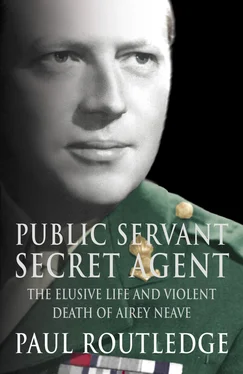On the short, crowded train journey from Dresden, Neave studied his fellow passengers. In his compartment, a German officer took in the sight of British POWs in battledress uniforms and muttered nervously to his gargantuan Hausfrau Hilde: ‘Kriegsgefangener ! ’ (prisoners of war). She spent the journey complaining loudly about the flight of Hitler’s right-hand man, Rudolf Hess, on 10 May. Why did the Führer not stop him? Where did he get the plane? This was news indeed. Hilde was very cross. Hess had apparently parachuted into Scotland from a Luftwaffe plane, bearing a message of reconciliation to the Duke of Hamilton, and had promptly been interned. (Neave would later meet him in a cell at Nuremberg, where he served war crimes charge papers on him.) On this morning, however, the mere mention of Hess’s name in front of the enemy prompted the browbeaten officer to silence his wife. The prisoners broke into smiles. Neave lit his pipe and winked at his comrades-in-arms.
The party of five ‘bad boys’ arrived at Colditz in the early morning of 14 May 1941. They were drawn up at the station and marched across the cobbled Bahnhofstrasse and up Badergasse, crossing the shallow but fast-flowing River Mulde by a wide, modern bridge 50 yards long. From here, they skirted the main square and trooped up the short, cobbled access road to the castle, across the moat bridge and through the great gates of the inner courtyard. ‘I felt the battlements close in, enfolding us, so that I looked round in fear,’ Neave recalled later. ‘White faces peered at me from the windows, and men in strange clothes paced up and down in the shadows.’ 4 Then he spotted John Hyde-Thomson, an officer of the Durham Light Infantry who had also escaped from Thorn, clattering along the cobbles in clogs to welcome him. He was quickly made to feel at home, not just with the contingent of twenty British prisoners but with the polyglot community of Poles, French, Belgian, Dutch and Serb POWs. After the depression of Thorn, Colditz, for all its forbidding appearance, was like escaping from a turgid political meeting to ‘a salon filled with wit and self-confidence’.
Incredibly, among the small British company were three clergymen from the Chaplains’ Department. One, J. Ellison Platt, an army Methodist chaplain who had chosen to stay with the wounded at Dunkirk rather than get away, observed the newcomers. In his diary, published long after the war, Platt recorded on the day of Neave’s arrival that the camp was rapidly filling up. The French contingent numbered two hundred ‘and the British increase by ones and twos daily’. 5 The padres led the latest intake up a stone staircase to a large hall on the first floor, where all but the most senior British officers lived. Neave felt as if he were being ushered by masters to a school for waifs and strays. After a meal of hot stew, German bread and lard, they were escorted to smaller rooms off the mess hall where they were allocated bunks. Neave immediately fell into a deep sleep.
He was roused at 7.30 the next morning by the shouts of ‘ Aufstehen ’ (get up) by German NCOs walking through the dormitories. Thereafter he was inducted into the daily routine. Breakfast, of ersatz German coffee made from acorns, bread and margarine, was brought up to their quarters half an hour later by British orderlies. At 8.30 all the prisoners assembled in their national contingents in the courtyard for Appell – roll-call. After much laborious counting and saluting, the prisoners were allowed to get on with their hobbies: reading, music lessons, language lessons and exercise. The daily routine altered little, until the escapes began in earnest, when the Germans instituted more roll-calls to reduce the opportunities for getting out. ‘Lunch’, usually a thick barley gruel very occasionally containing pork skin, was served at 12.30, and the final roll-call took place at 9.00 p.m. Soon after, they were locked into their cells for ‘lights out’. For undergraduates of Colditz academy, however, this was simply the signal to start a night shift of intense activity.
Perhaps with some overstatement, Neave later insisted that every single officer in the castle had but a single thought – to escape. Lord Campbell of Alloway QC, then plain Alan Campbell, a young army officer who was one of the first to be sent to Oflag IVc, remembers: ‘One spent most of one’s time trying to escape. We were always planning escapes or doing escapes.’ 6 Campbell occupied the bunk below Neave and so observed him at close quarters. ‘We never quarrelled. I found him agreeable, amusing. But I never got to know him. He was a withdrawn, distant character, with a slightly isolationist, ruthless streak.’ Ken Lockwood, a stockbroker in civilian life who looked after the British ‘shop’ and supplied would-be escapers with German money, comments that Neave in particular was keen to get out, but points out: ‘We couldn’t all escape. One accepted that. But the object of the exercise was to get somebody out of the camp and if possible get them away successfully.’ He concurs with Alloway’s assessment that Neave was ‘very quiet, very much his own man. I don’t think any of us got to know him really well.’ 7
The prisoners engaged in a restless battle with the ‘goons’, as the hapless German guards were known, and they were endlessly busy looking for anything that might aid themselves, or others, to get out. Neave plunged himself into this hive of industry with relish, delighted that he no longer had to fear the mild disapproval of fellow inmates content to live out the war that he had experienced in previous camps. Eggers deplored the attitude of his recalcitrant charges. ‘Indiscipline, I can truly say, was the unspoken order of the day on their side: indiscipline often amounting to plain personal insolence, or at least studied offhandedness.’ 8 He singled out the British as being particularly obstreperous. They even used occasional excursions to the town football ground to show off how well turned out and disciplined they could be while marching through the streets, giving chocolate to the children, until this privilege was stopped. The Germans realised they were mounting a magnificent piece of counter-propaganda, at their own expense.
Neave was not involved in the first serious attempt at a British breakout, which took place only a month after he arrived. Twelve officers, including two Poles, tunnelled their way out of the canteen, having successfully (as they believed) bribed a German guard 700 Reichsmarks to look the other way when they made their exit on to a small patch of grass beneath the parapet. The sentry accepted the down payment of 100 marks, and promptly betrayed them to the Kommandantur. The sentry was allowed to keep the money, promoted, sent on leave and given a War Service Medal.
Watching this botched escape from his window at two in the morning, Neave brooded on the shortcomings of tunnels as the best way to get out. Escapers, he concluded, must pit their wits against something frailer than the castle walls – the Germans themselves, as the last escapers had in part tried to do. The gap in their defence seemed to lie in the hope that the guards would be deceived by a bold attempt to leave by the front gate dressed in German uniform. While he pondered this plan, Neave joined ‘the board’ of an international tunnel, comprising British, French, Polish and Belgian officers. He had scant confidence in the project, but in a schoolboyish way he felt he had a place in the second eleven. The tunnel was started under a bed in the sick bay and went through the floor of the Red Cross parcel room below. From there, the international consortium argued about what direction to take. Nonetheless, they worked with a vigour, using broken knives, forks, door latches – anything metal they could lay their hands on – until four months later the tunnel stretched for 20 feet beneath the Red Cross room floor. Neave had no faith in its success, but he believed in the self-discipline that all escaping activity encouraged. It strengthened the spirit of POWs, occupied their mind and reduced the tedium that could otherwise drive them to distraction.
Читать дальше












